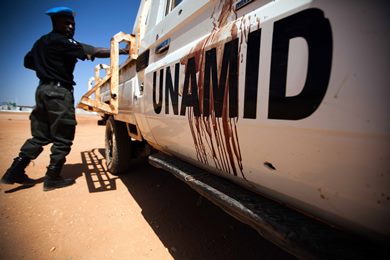Security Council extends UNAMID mandate, calls for revised focus
August 27, 2014 (KHARTOUM) – The UN Security Council (UNSC) has extended for the mandate of the African Union-United Nations Mission in Darfur (UNAMID) for one year and asked the hybrid operation to focus on its revised strategic priorities.

When established in 2007, the joint mission was mainly tasked with the protection of civilians, protection of aid workers and convoys of humanitarian assistance, monitoring and verifying implementation of agreements, and supporting efforts for to end the 11-year conflict.
In April 2014, the Security Council voted a resolution redefining the mandate of the UNAMID. The revised strategic priorities include the protection of civilians, the facilitation of the delivery of humanitarian assistance and the safety and security of humanitarian personnel.
The resolution 20148 (2014) further provides that the mandate of the includes “mediation between the Government of Sudan and non-signatory armed movements on the basis of the DDPD, while taking into account ongoing democratic transformation at the national level; and support to the mediation of community conflict, including through measures to address its root causes”.
UNAMID chief and joint mediator, Mohamed Ibn Chambas, in line with his revised mandate, organises during the upcoming days, a meeting in Addis Ababa for Darfur rebel groups and the SPLM-N in order to discuss ways to achieve a comprehensive peace in Sudan. This consultations meeting is co-organised the head of AU High-Level Implementation Panel, Thabo Mbeki.
“The resolution prioritises protection of civilians and humanitarian efforts in UNAMID’s work and requests enhanced human rights reporting from the Mission,” said Ambassador Mark Lyall Grant of the United Kingdom, which holds the rotating presidency of the council for this month.
Grant stressed that the Council want to use this opportunity to “make any necessary changes to improve the working of UNAMID.”
During the past months the UNAMID was accused of covering up crimes committed against civilians and peacekeepers in the western Sudan region. The UN secretary-general formed a committee to investigate these allegations but no report has been issued since.
He concluded by saying that “The resolution requests comprehensive and wide-ranging recommendations on the future mandate, configuration, composition, and exit strategy of UNAMID for next February, and expresses the Council’s clear intention to take prompt action on those recommendations”.
SUDAN DISAPPOINTED
The Sudanese ambassador at the UN, Rahmatallah Mohamed Osman, deplored that this resolution did not take into consideration all the new positive developments in Darfur in the past 12 months.
Osman called for more support for government efforts to bring stability and development in Darfur, adding that displaced people are now returning to their homes across the region .
He further stressed the need to adapt the mandate of the hybrid mission with the requirement of the current stage, saying the UNSC has “to go beyond the language of condemnation and expression concern as long as the security and humanitarian situation has stabilised significantly”.
The Sudanese envoy has requested that the UNSC apply more pressure on rebel groups to join the national dialogue process, reaffirming his government’s determination to conduct the internal process.
He also asked for consideration to be given to how the mission’s mandate could be terminated, saying it will be meaningless by the end of the dialogue.
(ST)
